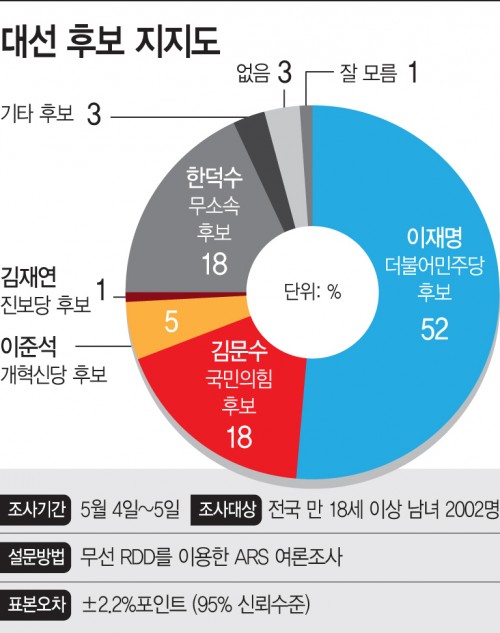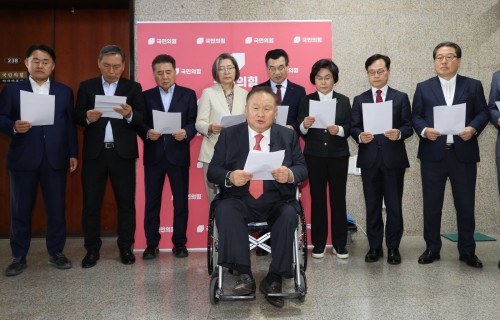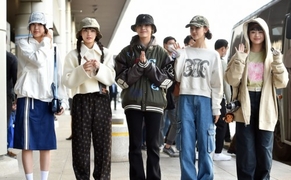 |
 |
| Lee Sang-min, head of the People Power Party's Daejeon Yuseong district chapter, joins around 40 other non-parliamentary chapter heads at the National Assembly in Yeouido, Seoul, on May 6, urging a unified candidacy between presidential hopefuls Kim Moon-soo and independent candidate Han Duck-soo. / Yonhap News |
With less than a month remaining before South Korea's June 3 presidential election, a new poll suggests that unifying conservative candidates Kim Moon-soo of the People Power Party and independent Han Duck-soo is essential to prevent a landslide victory by Democratic Party candidate Lee Jae-myung.
According to a poll conducted by the Korea Opinion and Reputation Research Agency (KOPRA) and commissioned by Asia Today, Lee leads with 52% support. Both Kim and Han trail far behind with 18% each, tied for second place. Reform New Party candidate Lee Jun-seok came in fourth with 5%.
Even when combining the support for Kim and Han—and adding that of Lee Jun-seok, who has been mentioned as a potential member of a broad anti-Lee coalition—the total reaches only 41%, still more than 10 percentage points behind Lee Jae-myung. The findings underscore growing pressure within the conservative bloc to merge candidacies before the April 11 registration deadline.
The poll also revealed striking similarities in the support bases of Kim and Han. Among voters aged 70 and older, Kim polled at 31% and Han at 27%. In the Busan-Ulsan-Gyeongnam region, support for Kim and Han was nearly identical at 20% and 23%, respectively. In the swing region of Daejeon-Sejong-Chungcheong, both scored in the low 20% range. Among self-identified conservatives, Kim received 36% and Han 31%, further indicating a division of the right-leaning vote.
This fragmentation has led to growing calls for a unified conservative ticket. Some analysts believe that a merger could create a synergistic effect strong enough to make the race competitive. However, the clock is ticking: the final list of candidates will be locked in once registration closes on May 11.
Despite the People Power Party’s recent primary, which was expected to boost momentum, the so-called "convention effect" has been weak. In terms of party support, the PPP trails the Democratic Party 35% to 49%, a 14-point gap that widened from just 1 point in a KOPRA poll conducted a week earlier.
Commenting on the prospects of a Kim-Han alliance, a political analyst stated, “Even a unity government between the two may not guarantee victory. To win, they would need to unite not only conservatives but all democratic forces and constitutional reform advocates opposed to pro-North and anti-state factions.”
The survey, conducted on May 4–5 using an automated response system via wireless RDD, had a sample size of 2,002 adults aged 18 and older. The margin of error was ±2.2 percentage points at a 95% confidence level, with a response rate of 8.2%. Weighting was applied based on the Ministry of Interior and Safety's April 2025 population data. Full details are available on the website of the National Election Survey Deliberation Commission.
Most Read
-
1
-
2
-
3
-
4
-
5
-
6
-
7





















